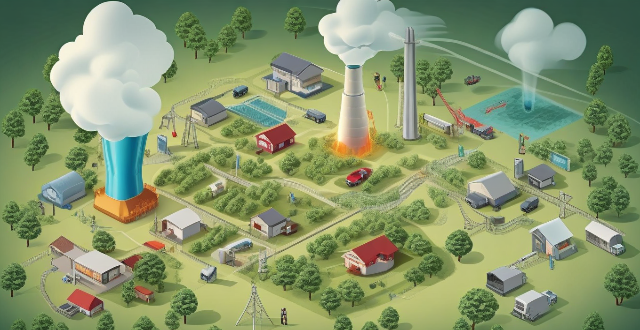The article discusses the relationship between waste reduction and energy conservation, highlighting their importance in promoting sustainable development. Waste reduction strategies such as recycling, composting, reusing materials, and reducing packaging conserve natural resources, reduce landfill space, and lower greenhouse gas emissions. Energy conservation measures like using energy-efficient appliances, improving insulation, and promoting renewable energy sources lead to lower energy costs, reduced greenhouse gas emissions, and promote sustainable development. The practices are interconnected, with recycling saving energy, composting reducing energy use, reducing packaging saving energy, energy-efficient appliances reducing waste, and promotion of renewable energy sources conserving energy and reducing waste.

The Relationship between Waste Reduction and Energy Conservation
Waste reduction and energy conservation are closely related concepts that play a crucial role in promoting sustainable development. Both practices aim to minimize the negative impact of human activities on the environment, conserve natural resources, and reduce greenhouse gas emissions. In this article, we will explore the relationship between waste reduction and energy conservation in detail.
Importance of Waste Reduction
Waste reduction refers to the practice of minimizing the amount of waste generated by individuals, businesses, and industries. It involves adopting strategies such as recycling, composting, reusing materials, and reducing packaging. By reducing waste, we can:
- Conserve Natural Resources: Less waste means fewer resources are needed to produce new products, conserving valuable natural resources like timber, minerals, and fossil fuels.
- Reduce Landfill Space: Less waste means less space is required for landfills, which can have adverse environmental impacts like soil contamination and air pollution.
- Lower Greenhouse Gas Emissions: When waste is sent to landfills, it decomposes and releases methane, a potent greenhouse gas. By reducing waste, we can lower these emissions and mitigate climate change.
Importance of Energy Conservation
Energy conservation refers to the practice of using energy efficiently and minimizing unnecessary energy consumption. It involves implementing measures such as using energy-efficient appliances, improving insulation in buildings, and promoting renewable energy sources. By conserving energy, we can:
- Lower Energy Costs: Using energy efficiently reduces the demand for energy, leading to lower energy bills for households and businesses.
- Reduce Greenhouse Gas Emissions: Burning fossil fuels for energy production releases carbon dioxide, a major greenhouse gas contributing to climate change. By conserving energy, we can lower these emissions and help combat climate change.
- Promote Sustainable Development: Energy conservation supports sustainable development by ensuring that future generations have access to adequate energy resources.
Relationship between Waste Reduction and Energy Conservation
The relationship between waste reduction and energy conservation is multifaceted and mutually beneficial. Here are some key ways in which these practices are interconnected:
1. Recycling Saves Energy
Recycling materials like paper, plastic, and aluminum requires less energy than producing new products from raw materials. For example, recycling aluminum cans saves up to 95% of the energy required to produce new aluminum from bauxite ore. By reducing waste through recycling, we can conserve significant amounts of energy.
2. Composting Reduces Energy Use
Composting organic waste like food scraps and yard trimmings creates a nutrient-rich soil amendment that can replace synthetic fertilizers, which require large amounts of energy to produce. Additionally, composting reduces the need for energy-intensive waste disposal methods like landfilling and incineration.
3. Reducing Packaging Saves Energy
Packaging accounts for a significant portion of municipal solid waste (MSW) generated globally. By reducing packaging through reusable containers and minimalist product design, we can save energy used in manufacturing and transporting excess packaging materials.
4. Energy-Efficient Appliances Reduce Waste
Energy-efficient appliances like refrigerators, washing machines, and dishwashers use less energy while providing the same level of performance as their inefficient counterparts. By using these appliances, we can reduce both energy consumption and the amount of waste generated by replacing older, inefficient appliances more frequently.
5. Promotion of Renewable Energy Sources
Renewable energy sources like solar, wind, and hydroelectric power generate electricity with minimal environmental impact compared to fossil fuels. By promoting renewable energy sources, we can conserve energy and reduce waste associated with fossil fuel extraction, transportation, and combustion.
In conclusion, waste reduction and energy conservation are closely intertwined practices that share common goals of promoting sustainability, conserving natural resources, and mitigating climate change. By adopting strategies that address both waste reduction and energy conservation simultaneously, we can create a more sustainable future for ourselves and future generations.